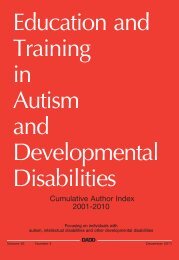Education and Training in Autism and Developmental Disabilities
Education and Training in Autism and Developmental Disabilities
Education and Training in Autism and Developmental Disabilities
You also want an ePaper? Increase the reach of your titles
YUMPU automatically turns print PDFs into web optimized ePapers that Google loves.
In a number of comments, respondents did<br />
not appear to give the parent the benefit of<br />
the doubt:<br />
I: So you are say<strong>in</strong>g that the partnership is<br />
fail<strong>in</strong>g because the teachers are pull<strong>in</strong>g<br />
their weight, but the parents aren’t meet<strong>in</strong>g<br />
you <strong>in</strong> the middle?<br />
R: Right. And that is <strong>in</strong> general. I have a few<br />
parents who are very, very good about that<br />
<strong>and</strong> some that I never see . . .<br />
R: I am one of those people who believes<br />
that that is usually the miss<strong>in</strong>g <strong>in</strong>gredient <strong>in</strong><br />
schools–parents/guardians not be<strong>in</strong>g <strong>in</strong>volved<br />
enough.<br />
In this situation, reasons were not stated about<br />
why it might be extremely difficult for parents<br />
to be <strong>in</strong>volved because of other responsibilities<br />
or stressors <strong>in</strong> their life. Rather, when this<br />
professional “never sees” parents, it does not<br />
appear that there is reflection on what the<br />
barriers might be <strong>and</strong> what some creative options<br />
might be for work<strong>in</strong>g around those barriers.<br />
Given this situation, the <strong>in</strong>terviewer tried to<br />
prompt the participants to consider some<br />
other possibilities for parents’ lack of partnership:<br />
R: If your child is dismissed from a service,<br />
it is a celebration. Not a “Well, why is he<br />
be<strong>in</strong>g dismissed? He needs that!” Well,<br />
you’re tak<strong>in</strong>g away his help. No, it’s a celebration.<br />
. .<br />
I: Do they take it as you’re giv<strong>in</strong>g up?<br />
R: Yes. Absolutely that is exactly what it is.<br />
You’re giv<strong>in</strong>g up on them.<br />
I: They don’t qualify any more because<br />
they. . .<br />
R: because they have made m<strong>in</strong>imal or no<br />
improvement over one academic year.<br />
I: I guess I can underst<strong>and</strong> why they don’t<br />
necessarily want to celebrate because they<br />
plateaued for over a year.<br />
R: Yeah. Right. But you see what I am say<strong>in</strong>g.<br />
It was not uncommon for participants to<br />
speak about parents who just don’t “accept”<br />
the diagnosis rather than seek<strong>in</strong>g alternative<br />
reasons for the parents’ behavior (e.g., such as<br />
not agree<strong>in</strong>g with an <strong>in</strong>tervention) or consid-<br />
er<strong>in</strong>g how they might feel <strong>in</strong> the parents’ position.<br />
For example, one participant noted:<br />
The ones that don’t want to accept it give<br />
pretty much just, they don’t want anyth<strong>in</strong>g<br />
to do with it. You know, <strong>and</strong> that makes it<br />
really hard when the parents won’t accept<br />
it, <strong>and</strong> then they don’t back you up.”<br />
Another participant appeared to agree that<br />
parents are “<strong>in</strong> denial”: “To be open, to have<br />
ideas, to be accept<strong>in</strong>g of it, because I th<strong>in</strong>k<br />
sometimes parents want to push it off that it is<br />
some other problem.”<br />
Alternatively, some respondents particularly<br />
sought to “st<strong>and</strong> <strong>in</strong> parents’ shoes” see<strong>in</strong>g<br />
th<strong>in</strong>gs from their perspective as contrasted to<br />
blam<strong>in</strong>g them. One more experienced professional<br />
believed that colleagues who held op<strong>in</strong>ions<br />
like those expressed above were not realistic<br />
about the emotional impact a diagnosis<br />
has on the family. She said, “I am fasc<strong>in</strong>ated by<br />
the idea that we th<strong>in</strong>k that families shouldn’t<br />
be upset, like of course they are go<strong>in</strong>g to be<br />
upset! Why are we surprised by that?”<br />
It is important to note a few of the more<br />
experienced professionals spoke of what they<br />
have learned dur<strong>in</strong>g the span of their career<br />
<strong>and</strong>/or as a result of hav<strong>in</strong>g children.<br />
R: . . . I remember be<strong>in</strong>g real snippy early<br />
on, “Well why wouldn’t you keep this appo<strong>in</strong>tment?”<br />
s<strong>in</strong>ce I knew they weren’t<br />
work<strong>in</strong>g so . . . why can’t they get here for<br />
this appo<strong>in</strong>tment or that? And then it is<br />
funny when you f<strong>in</strong>ally figure out what really<br />
goes on <strong>in</strong> their lives, how you can be<br />
empathetic <strong>and</strong> have compassion, because<br />
it is so difficult sometimes to get these kids<br />
that have multiple h<strong>and</strong>icaps up. And then<br />
when we hear their schedules, about how<br />
many different appo<strong>in</strong>tments they have with<br />
how many different health care providers,<br />
how they even manage to get it all done! So,<br />
I th<strong>in</strong>k that has made me a better person<br />
<strong>and</strong> a better health care provider.<br />
Another professional thought back on her<br />
own growth <strong>and</strong> change <strong>in</strong> perspective:<br />
R: I was so frustrated <strong>and</strong> annoyed with<br />
them for their lack of ability to followthrough,<br />
<strong>and</strong> I th<strong>in</strong>k more experience <strong>and</strong><br />
be<strong>in</strong>g a parent made a huge difference <strong>in</strong><br />
my tolerance, <strong>and</strong> so I th<strong>in</strong>k knowledge of<br />
362 / <strong>Education</strong> <strong>and</strong> <strong>Tra<strong>in</strong><strong>in</strong>g</strong> <strong>in</strong> <strong>Autism</strong> <strong>and</strong> <strong>Developmental</strong> <strong>Disabilities</strong>-September 2010

















